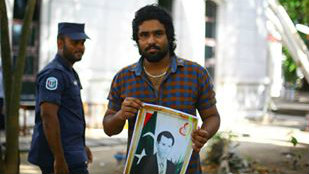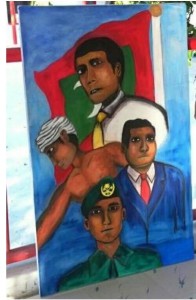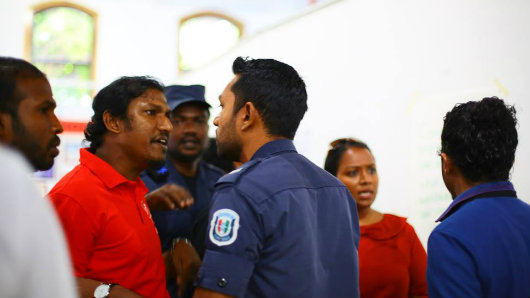A group of local artists staged a protest at the national art gallery today over the exclusion of paintings depicting former President Mohamed Nasheed from an exhibition organised by the education ministry.
The exhibition, launched yesterday, featured artwork and handicraft by students from 32 schools as part of events planned by the government to mark the upcoming golden jubilee of the country’s independence.
“Nasheed is said to be the Mandela of the Indian Ocean and I personally have a lot of respect for him. That is why I chose to paint him,” 18-year-old Mohamed Raaif told Minivan News today.
The Maldives National University student explained that his painting was initially put up, but he later discovered that it had been removed.

Raaif said a teacher told him that the organisers claimed his painting was of “a terrorist” and could not be displayed.
The opposition leader was found guilty of terrorism on Friday night (March 13) and sentenced to 13 years in prison over the military’s detention of Criminal Court Chief Judge Abdulla Mohamed in January 2012.
Education ministry officials in charge of organising the exhibition could not be reached at the time of publication.
A second painting by a student featuring the former president was also removed.
However, artwork featuring other politicians with blurred faces were displayed at the exhibition.
Raaif said he spent three days working on the painting and had stayed up all night to complete it. He said he was hoping to raise funds for his mother’s backbone surgery as the family was currently facing financial constraints.
He added that he did not have any intention of politicising the painting. However, Raaif said he associated the theme of the exhibition – freedom or independence – with former President Nasheed.
“Not free yet”
Online news outlet CNM reported that the second banned painting of Nasheed was from a grade ten student at the Addu City Feydhoo School.
City Feydhoo School.
“That photo is of a terrorist. Photos of terrorists cannot be promoted,” organisers allegedly said, according to an anonymous source.
Meanwhile, a group of about 30 people, including several artists, staged a silent protest inside the art gallery today, mingling with members of the public and holding up prints of the banned Nasheed paintings.
The exhibition was open to the public with free entrance.
The protesters also carried placards calling for freedom of expression and assembly as guaranteed by the constitution and stuck posters on the gallery walls that read, “Not free yet!” and “Minimum 50 years in prison.”
“The function of freedom is to free someone else,” read one of the posters, quoting Chinese dissident and Nobel laureate, Ai Weiwei.
“The work of art was a scream for freedom. Minivan [independent] 50 has not reached us yet!” read one of the placards held up by a protester.
An artist at today’s protest, Kareen Adam, told Minivan News: “The state cannot dictate to us what we can paint, draw, write or think etc. They should have called this exhibition ‘freedom within boundaries’ instead.”
Others artists said the organisers were sending a negative message to youth by banning the paintings of Nasheed, stating that former President Nasheed was an ineradicable part of recent Maldivian history.
Around 4:30pm – half an hour after the exhibition opened for the day – protesters told Minivan News that police asked them to leave as organisers had said the art gallery was closing.
A group led by Youth Ministry Coordinator Ali ‘Steps Ayya’ Shahid meanwhile arrived and began tearing down the material pasted on the walls.
“We will not keep paintings of terrorists,” one of the men allegedly said.
Protesters said the men tore down the paintings and ripped up the posters as police officers watched impassively.
A police officer was also photographed ripping a poster.

Police told the protesters that the men had clearance to enter the gallery as they had passes of government coordinators.
One of the protesters took a photograph of the men and was allegedly pushed away.
The men also pushed out the protesters from the gallery. Protesters who spoke to Minivan News asked not to be named as they feared becoming targeted and said they did not have confidence that police would provide protection.
Step Ayya & Harrins Ammadey in Action. Coordinator inge Job description ga himeney kan @pink_steps @vaitheyoammadey pic.twitter.com/0y6sha9kFz
— JP Male’ City (@JP_Male) March 17, 2015
Related to this story
Former President Nasheed found guilty of terrorism, sentenced to 13 years in prison
Government will ensure Nasheed’s right to appeal conviction, says spokesperson
Respect Criminal Court verdict, says President Yameen
